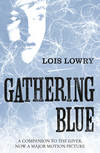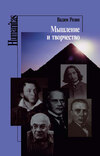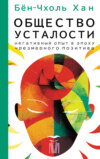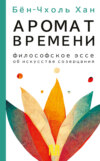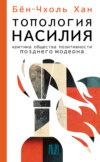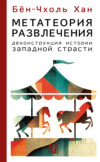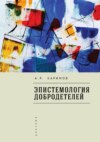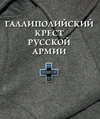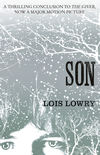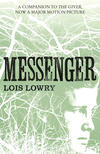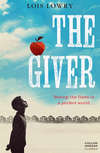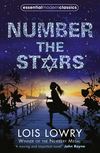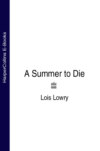Czytaj książkę: «Gathering Blue»

Table of Contents
Cover
Title Page
Chapter One
Chapter Two
Chapter Three
Chapter Four
Chapter Five
Chapter Six
Chapter Seven
Chapter Eight
Chapter Nine
Chapter Ten
Chapter Eleven
Chapter Twelve
Chapter Thirteen
Chapter Fourteen
Chapter Fifteen
Chapter Sixteen
Chapter Seventeen
Chapter Eighteen
Chapter Nineteen
Chapter Twenty
Chapter Twenty-One
Chapter Twenty-Two
Chapter Twenty-Three
Read all of the incredible books in The Giver Quartet
About the Author
Other novels in The Giver Quartet
Copyright
About the Publisher
MOTHER?”
There was no reply. She hadn’t expected one. Her mother had been dead now for four days, and Kira could tell that the last of the spirit was drifting away.
“Mother.” She said it again, quietly, to whatever was leaving. She thought that she could feel its leave-taking, the way one could feel a small whisper of breeze at night.
Now she was all alone. Kira felt the aloneness, the uncertainty, and a great sadness.
This had been her mother, the warm and vital woman whose name had been Katrina. Then after the brief and unexpected sickness, it had become the body of Katrina, still containing the lingering spirit. After four sunsets and sunrises, the spirit, too, was gone. It was simply a body. Diggers would come and sprinkle a layer of soil over the flesh, but even so it would be eaten by the clawing, hungry creatures that came at night. Then the bones would scatter, rot, and crumble to become part of the earth.
Kira wiped briefly at her eyes, which had filled suddenly with tears. She had loved her mother, and would miss her terribly. But it was time for her to go. She wedged her walking stick in the soft ground, leaned on it, and pulled herself up.
She looked around uncertainly. She was young still, and had not experienced death before, not in the small two-person family that she and her mother had been. Of course she had seen others go through the rituals. She could see some of them in the vast foul-smelling Field of Leaving, huddled beside the ones whose lingering spirits they tended. She knew that a woman named Helena was there, watching the spirit leave her infant, who had been born too soon. Helena had come to the Field only the day before. Infants did not require the four days of watching; the wisps of their spirits, barely arrived, drifted away quickly. So Helena would return to the village and her family soon.
As for Kira, she had no family, now. Nor any home. The cott she had shared with her mother had been burned. This was always done after sickness. The small structure, the only home Kira had ever known, was gone. She had seen the smoke in the distance as she sat with the body. As she watched the spirit of her mother drift away, she had seen the cindered fragments of her childhood life whirl into the sky as well.
She felt a small shudder of fear. Fear was always a part of life for the people. Because of fear, they made shelter and found food and grew things. For the same reason, weapons were stored, waiting. There was fear of cold, of sickness and hunger. There was fear of beasts.
And fear propelled her now as she stood, leaning on her stick. She looked down a last time at the lifeless body that had once contained her mother, and considered where to go.
* * *
Kira thought about rebuilding. If she could find help, though help was unlikely, it wouldn’t take long to build a cott, especially not this time of year, summer-start, when tree limbs were supple and mud was thick and abundant beside the river. She had often watched others building, and Kira realized that she could probably construct some sort of shelter for herself. Its corners and chimney might not be straight. The roof would be difficult because her bad leg made it almost impossible for her to climb. But she would find a way. Somehow she would build a cott. Then she would find a way to make a life.
Her mother’s brother had been near her in the Field for two days, not guarding Katrina, his sister, but sitting silently beside the body of his own woman, the short-tempered Sol-ora, and that of their new infant who had been too young to have a name. They had nodded to each other, Kira and her mother’s brother, in acknowledgment. But he had departed, his time in the Field of Leaving finished. He had tykes to tend; he and Solora had two others in addition to the one that had brought about her death. The others were still small, their names yet of one syllable: Dan and Mar. Perhaps I could care for them, Kira thought briefly, trying to find her own future within the village. But even as the thought flickered within her, she knew that it would not be permitted. Solora’s tykes would be given away, distributed to those who had none. Healthy, strong tykes were valuable; properly trained, they could contribute to family needs and would be greatly desired.
No one would desire Kira. No one ever had, except her mother. Often Katrina had told Kira the story of her birth—the birth of a fatherless girl with a twisted leg—and how her mother had fought to keep her alive.
“They came to take you,” Katrina said, whispering the story to her in the evening, in their cott, with the fire fed and glowing. “You were one day old, not yet named your one-syllable infant name—”
“Kir.”
“Yes, that’s right: Kir. They brought me food and were going to take you away to the Field—”
Kira shuddered. It was the way, the custom, and it was the merciful thing, to give an unnamed, imperfect infant back to the earth before its spirit had filled it and made it human. But it made her shudder.
Katrina stroked her daughter’s hair. “They meant no harm,” she reminded her.
Kira nodded. “They didn’t know it was me.”
“It wasn’t you, yet.”
“Tell me again why you told them no,” Kira whispered.
Her mother sighed, remembering. “I knew I would not have another child,” she pointed out. “Your father had been taken by beasts. It had been several months since he went off to hunt and did not return. And so I would not give birth again.
“Oh,” she added, “perhaps they would have given me one eventually, an orphan to raise. But as I held you—even then, with your spirit not yet arrived and with your leg bent wrong so that it was clear you would not ever run—even then, your eyes were bright. I could see the beginning of something remarkable in your eyes. And your fingers were long and well-shaped—”
“And strong. My hands were strong,” Kira added with satisfaction. She had heard the story so often; each time of hearing, she looked down at her strong hands with pride.
Her mother laughed. “So strong they gripped my own thumb fiercely and would not let go. Feeling that fierce tug on my thumb, I could not let them take you away. I simply told them no.”
“They were angry.”
“Yes. But I was firm. And, of course, my father was still alive. He was old then, four syllables, and he had been the leader of the people, the chief guardian, for a long time. They respected him. And your father would have been a greatly respected leader too had he not died on the long hunt. He had already been chosen to be a guardian.”
“Say my father’s name to me,” Kira begged.
Her mother smiled in the firelight. “Christopher,” she said. “You know that.”
“I like to hear it, though. I like to hear you say it.”
“Do you want me to go on?”
Kira nodded. “You were firm. You insisted,” she reminded her mother.
“Still, they made me promise that you would not become a burden.”
“I haven’t, have I?”
“Of course not. Your strong hands and wise head make up for the crippled leg. You are a sturdy and reliable helper in the weaving shed; all the women who work there say so. And one bent leg is of no importance when measured against your cleverness. The stories you tell to the tykes, the pictures you create with words—and with thread! The threading you do! It is unlike any threading the people have ever seen. Far beyond anything I could do!” Her mother stopped. She laughed. “Enough. You mustn’t tease me into flattery. Don’t forget that you are still a girl, and often willful, and just this morning, Kira, you forgot to tidy the cott even though you had promised.”
“I won’t forget tomorrow,” Kira said sleepily, snuggling against her mother on the raised sleeping mat. She pushed her twisted leg into a more comfortable position for the night. “I promise.”
* * *
But now there was no one to help her. She had no family left, and she was not a particularly useful person in the village. For everyday work, Kira helped in the weaving shed, picking up the scraps and leavings, but her twisted leg diminished her value as a laborer and even, in the future, as a mate.
Yes, the women liked the fanciful stories that she told to amuse restless tykes, and they admired the little threadings that she made. But those things were diversions; they were not work.
The sky, with the sun no longer overhead but sending shadows now into the Field of Leaving from the trees and thorn bushes at its edge, told her that it was long past midday. In her uncertainty she had lingered here too long. Carefully she gathered the skins on which she had slept these four nights guarding her mother’s spirit. Her fire was cold ashes, a blackened smudge. Her water container was empty and she had no more food.
Slowly, using her stick, she limped toward the path that led back to the village, holding on to a small hope that she might still be welcome there.
Tykes played at the edge of the clearing, scampering about on the moss-covered ground. Pine needles stuck to their naked bodies and in their hair. She smiled. She recognized each little one. There was the yellow-haired son of her mother’s friend; she remembered his birth two mid-summers ago. And the girl whose twin had died; she was younger than the yellow-haired one, just toddling, but she giggled and shrieked with the others, playing catch-me-while-I’m-running. Tussling, the toddlers slapped and kicked at each other, grabbing toy-sticks, flailing with their small fists. Kira remembered watching her childhood companions at such play, preparing for the real scramble of adult life. Unable to participate because of her flawed leg, she had watched from the sidelines with envy.
An older child, a dirty-faced boy of eight or nine years, still too young for puberty and the two-syllable name that he would receive, looked over at her from the place where he was clearing underbrush and sorting the twigs into bundles for firestarting. Kira smiled. It was Matt, who had always been her friend. She liked Matt. He lived in the swampy, disagreeable Fen, probably the child of a dragger or digger. But he ran freely through the village with his disorderly friends, his dog always at his heels. Often he stopped, as now, to do some chore or small job in return for a few coins or a sweet. Kira called a greeting to the boy. The dog’s bent tail, matted with twigs and leaves, thumped on the ground, and the boy grinned in reply.
“So you be back from the Field,” he said. “What’s it like there? Scared, was you? Did creatures come in the night?”
Kira shook her head and smiled at him. Younger, one-syllable tykes were not allowed in the Field, so it was natural that Matt would be curious and a little in awe. “No creatures,” she reassured him. “I had fire, and it kept them away.”
“So Katrina be gone now from her body?” he asked in his dialect. People from the Fen were oddly different. Always identifiable by their strange speech and crude manners, they were looked down upon by most people. But not by Kira. She was very fond of Matt.
She nodded. “My mother’s spirit has gone,” she acknowledged. “I watched it leave her body. It was like mist. It drifted away.”
Matt came over to her, still carrying an armful of twigs. He squinted at her ruefully and wrinkled his nose. “Your cott is horrid burnt,” he told her.
Kira nodded. She knew that her home had been destroyed, though secretly she had hoped she was mistaken. “Yes,” she sighed. “And everything in it? My frame? Did they burn my threading frame?”
Matt frowned. “I tried to save things but it’s mostly all burnt. Just your cott, Kira. Not like when there’s a big sickness. This time it just be your mum.”
“I know.” Kira sighed again. In the past there had been sicknesses that spread from one cott to the next, with many deaths. When that happened, a huge burning would take place, followed by a rebuilding that became almost festive with the noise of workers smearing wet mud over the fitted wooden sides of new structures, methodically slapping it into smoothness. The charred smell of the burning would remain in the air even as the new cotts rose.
But today there was no festivity. There were only the usual sounds. Katrina’s death had changed nothing in the lives of the people. She had been there. Now she was gone. Their lives continued.
With the boy still beside her, Kira paused at the well and filled her container with water. Everywhere she heard arguing. The cadence of bickering was a constant sound in the village: the harsh remarks of men vying for power; the shrill bragging and taunting of women envious of one another and irritable with the tykes who whined and whimpered at their feet and were frequently kicked out of the way.
She cupped her hand over her eyes and squinted against the afternoon sun to find the gap where her own cott had been. She took a deep breath. It would be a long walk to gather saplings and a hard chore to dig the mud by the riverbank. The corner timbers would be heavy to lift and hard to drag. “I have to start building,” she told Matt, who still held a bundle of twigs in his scratched, dirty arms. “Do you want to help? It could be fun if there were two of us.
“I can’t pay you, but I’ll tell you some new stories,” she added.
The boy shook his head. “I be whipped iffen I don’t finish the fire twiggies.” He turned away. After a hesitation, he turned back to Kira and said in a low voice, “I heared them talking. They don’t want you should stay. They be planning to turn you out, now your mum be dead. They be set on putting you in the Field for the beasts. They talk about having draggers take you.”
Kira felt her stomach tighten with fear. But she tried to keep her voice calm. She needed information from Matt and it would make him wary to know she was frightened. “Who’s ‘they’?” she asked in an annoyed, superior tone.
“Them women,” he replied. “I heared them talking at the well. I be picking up wood chippies from the refuse, and them didn’t even notice me listening. But they want your space. They want where your cott was. They aim to build a pen there, to keep the tykes and the fowls enclosed so they don’t be having to chase them all the time.”
Kira stared at him. It was terrifying, almost unbelievable, the casualness of the cruelty. In order to pen their disobedient toddlers and chickens, the women would turn her out of the village to be devoured by the beasts that waited in the woods to forage the Field.
“Whose was the strongest voice against me?” she asked after a moment.
Matt thought. He shifted the twigs in his hands, and Kira could see that he was reluctant to get involved in her problems and fearful of his own fate. But he had always been her friend. Finally, looking around first to be certain he wouldn’t be overheard, he told her the name of the person with whom Kira would have to do battle.
“Vandara,” he whispered.
It came as no surprise. Nonetheless, Kira’s heart sank.
FIRST, KIRA DECIDED, it made sense to pretend she knew nothing. She would go back to the site of the cott where she had lived with her mother and begin to rebuild. Perhaps the simple fact of seeing her there at work would deter the women who hoped to drive her away.
Leaning on her stick, she made her way through the crowded village. Here and there, people acknowledged her presence with a curt nod; but they were busy, all of them at their daily work, and pleasantries were not part of their custom.
She saw her mother’s brother. With his son, Dan, he was working in the garden beside the cott where he had lived with Solora and the tykes. Weeds had gone untended while his wife had neared her time, given birth, and died. Then more days had passed, more weeds had flourished, while he sat in the Field with his dead wife and infant. The poles that held beans entwined had toppled, and he was angrily setting them upright as Dan tried to help and the younger tyke, the girl named Mar, sat playing in the dirt at the edge. While Kira looked on, the man slapped his son hard on the shoulder, scolding him for not holding the pole straight.
She walked past them, planting her stick firmly in the ground with each step, planning to nod if they acknowledged her. But the small girl playing in the dirt only whimpered and spat; she had tried tasting some pebbles, in the way of toddlers, and had found herself with a mouthful of foul-tasting grit. The boy Dan glanced at Kira but made no sign of greeting or recognition; he was cringing from his father’s slap. The man, her mother’s only brother, didn’t look up from his labor.
Kira sighed. At least he had help. Unless she could enlist her small friend, Matt, and some of his mates, she would have to do all of her work—rebuilding, gardening—herself, assuming she was allowed to stay.
Her stomach growled, and she realized how hungry she was. Rounding the path past a row of small cotts, she approached her own location and came upon the black heap of ashes that had been her home. There was nothing left of their household things. But she was pleased to see that the little garden remained. Her mother’s flowers still bloomed, and the summer-start vegetables were ripening in the sun. For now, at least, she would have some food.
Or would she? As she watched, a woman darted out of a clump of nearby trees, glanced at Kira, and then brazenly began to pull carrots from the garden that Kira and her mother had tended together.
“Stop it! Those are mine!” Kira moved forward as quickly as she could, dragging her deformed leg.
Laughing contemptuously, the woman sauntered away, her hands filled with dirt-encrusted carrots.
Kira hurried to the remains of the garden. She set her water container on the ground, pulled up some tubers, brushed the dirt away, and began to eat. Without a hunter as part of their family, she and her mother had not eaten meat except for the occasional small creature that they could catch within the boundaries of the village. They could not go to the woods to hunt, the way men did. Fish from the river were plentiful and easy to catch, and they felt no need of anything more.
But the vegetables were essential. She was fortunate, she realized, that the garden had not been entirely stripped during her four days in the Field.
Her hunger satisfied, she sat down to rest her leg. She looked around. On the edge of her space, near the ashes, a pile of saplings stripped of their branches was arranged, as if someone had been preparing to help her rebuild.
But Kira knew better. She rose and tentatively picked up one of the slender, pliable saplings from the pile.
Vandara emerged immediately from the nearby clearing where Kira realized she had been waiting and watching. Kira didn’t know where the woman lived or who her hubby or children might be. Her cott was none of those nearby. But she was very much known in the village. People whispered about her. She was known, and respected. Or feared.
The woman was tall and muscular, with long, tangled hair pulled back roughly and tied with a thong at the back of her neck. Her eyes were dark, and her direct look pierced any calmness that Kira might have felt. The ragged scar that marked her chin and continued down her neck to her broad shoulder was said to be a remnant of a long-ago battle with one of the forest creatures. No one else had ever survived such a clawing, and the scar reminded everyone of Vandara’s courage and vigor as well as her malevolence. She had been attacked and clawed, the children whispered, when she tried to steal an infant creature from its mother’s den.
Today, facing Kira, she was once again preparing to destroy someone’s young.
Unlike the forest creature, Kira had no claws with which to fight. She gripped her wooden cane tightly and tried to stare back with no hint of fear.
“I’ve returned to rebuild my cott,” she told Vandara.
“Your space is gone. It’s mine now. Those saplings are mine.”
“I will cut my own,” Kira conceded. “But I will rebuild on this space. This was my father’s space before I was born, and my mother’s after he died. Now that she is dead, it’s mine.”
Other women emerged from surrounding cotts. “We need it,” one called. “We’re going to use the saplings to build a pen for the tykes. It was Vandara’s idea.”
Kira looked at the woman, who was holding the arm of a toddler roughly. “It might be a good idea,” Kira replied, “if you want to pen your little ones. But not on this piece of ground. You can build a pen somewhere else.”
She saw Vandara lean down and pick up a rock the size of a tyke’s fist. “We don’t want you here,” the woman said. “You don’t belong in the village anymore. You’re worthless, with that leg. Your mother always protected you but she’s gone now. You should go too. Why didn’t you just stay in the Field?”
Kira saw that she was surrounded by hostile women who had come from their cotts and were watching Vandara for instructions and leadership. Several, she noticed, had rocks in their hands. If one rock were thrown, others would follow, she knew. They were all waiting for the first.
What would my mother have done? she thought frantically, and tried to call wisdom from the bit of her mother’s spirit that lived on in her now.
Or my father, who never knew of my birth? His spirit is in me, too.
Kira straightened her shoulders and spoke. She held her voice steady and tried to meet the eyes of each woman in turn. Some lowered their gaze and looked at the ground. That was good. It meant they were weak.
“You know that in a village conflict that could bring death, we must go to the Council of Guardians,” Kira reminded them. She heard some murmurs of assent. Vandara’s hand still gripped the rock, and her shoulders were tense, preparing to throw.
Kira looked directly at Vandara but she was speaking to the others now, in need of their support. She appealed not to their sympathy, because she knew they had none, but to their fear.
“Remember that if conflict is not taken to the Council of Guardians, and if there is a death …”
She heard a murmur. “If there is a death …” she heard a woman repeat in an uncertain, apprehensive voice.
Kira waited. She stood as tall and straight as she could.
Finally a woman in the group completed words of the rule. “The causer-of-death must die.”
“Yes. The causer-of-death must die.” Other voices repeated it. One by one they released the rocks. One by one each woman chose not to be a causer-of-death. Kira began to relax slightly. She waited. She watched.
Finally only Vandara still held her weapon. Glaring, Vandara menaced her, bending her elbow as if to throw. But at last she too dropped the rock on the ground, with a slight harmless toss toward Kira.
“I will take her to the Council of Guardians then,” Vandara announced to the women. “I am willing to be her accuser. Let them cast her out.” She laughed harshly. “No need for us to waste a life getting rid of her. By sunset tomorrow this ground can be ours and she will be gone. She will be in the Field, waiting for the beasts.”
The women all glanced toward the forest, deep in shadows now: the place where the beasts waited. Kira forced herself not to follow their looks with her own eyes.
With the same hand that had held the rock, Vandara stroked the scar on her throat. She smiled cruelly. “I remember what it was like,” she said, “to see your own blood pour upon the ground.
“I survived,” she reminded them all. “I survived because of my strength.
“By night-start tomorrow, when she feels the claws at her throat,” she went on, “this two-syllable mistake of a girl will wish she had died of sickness beside her mother.”
Nodding in agreement, the women turned their backs on Kira and moved away, scolding and kicking at the small tykes by their sides. The sun was low in the sky now. They would attend to their evening tasks, preparing for the return of the village men, who would need food and fire and the wrapping of wounds.
One woman was soon to give birth; perhaps that would happen tonight, and the others would attend her, muffling her cries and assessing the value of the infant. Others would be coupling tonight, creating new people, new hunters for the future of the village as the old ones died of wounds and illness and age.
Kira did not know what the Council of Guardians would decide. She knew only that whether she was to stay or go, to rebuild on her mother’s piece of land or to enter the Field and face the creatures who were waiting in the forest, she would have to do it alone. Wearily she sat on the ash-blackened earth to wait for night.
She reached for a nearby piece of wood and turned it over in her hands, measuring its strength and its straightness. For a cott, should she be permitted to stay, she would need some sturdy lengths of solid wood. She would go to the woodcutter named Martin. He had been her mother’s friend. She could barter with him, maybe offering to decorate a fabric for his wife, in exchange for the beams she would need.
For her future, for the work with which she thought she might earn her living, she would also need some small, straight pieces of wood. This one was too pliable and would not do, she realized, and dropped it on the ground. Tomorrow, if the Council of Guardians decided in her favor, she would look for the kind of wood she needed: short, smooth pieces she could fit together at the corners. She was already planning to build a new threading frame.
Kira had always had a clever way with her hands. When she was still a tyke, her mother had taught her to use a needle, to pull it through woven fabric and create a pattern with colored threads. But suddenly, recently, the skill had become more than simple cleverness. In one astounding burst of creativity, her ability had gone far beyond her mother’s teaching. Now, without instruction or practice, without hesitancy, her fingers felt the way to twist and weave and stitch the special threads together to create designs rich and explosive with color. She did not understand how the knowledge had come to her. But it was there, in her fingertips, and now they trembled slightly with eagerness to start. If only she was allowed to stay.
Darmowy fragment się skończył.


